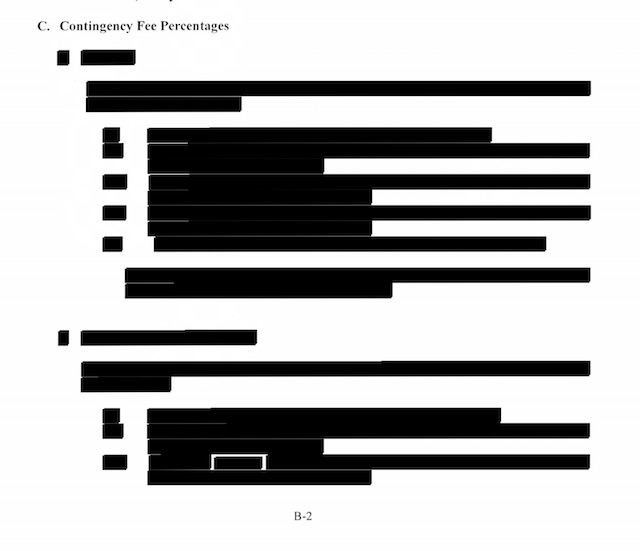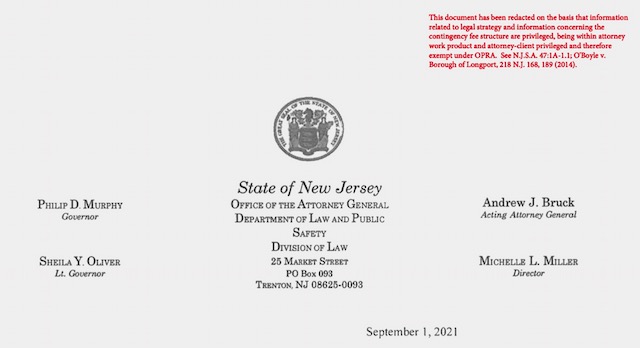Murphy DEP Refuses To Disclose How Much Hired Gun Law Firms Will Be Paid In Ford Motor Company Ringwood Lawsuit
Lawsuit Results In Privatization Of The Attorney General’s Office And DEP
Contingency Fees Redacted
The AG/DEP Press Releases Didn’t Even Mention Private Law Firms
 On June 16, the Murphy DEP and Attorney General jointly issued a press release touting their lawsuit against Ford Motor Company. The lawsuit seeks compensation for damages to publicly owned natural resources for many years of illegal hazardous waste dumping at the Ringwood Superfund site.
On June 16, the Murphy DEP and Attorney General jointly issued a press release touting their lawsuit against Ford Motor Company. The lawsuit seeks compensation for damages to publicly owned natural resources for many years of illegal hazardous waste dumping at the Ringwood Superfund site.
The press release failed to mention that three private law firms are representing DEP in this litigation:
The Ford Motor Co. matter is being handled by Deputy Attorneys General Thomas Lihan and Carley Doyle of the Environmental Enforcement and Environmental Justice (EEEJ) Section within the Division of Law’s Affirmative Civil Enforcement Practice Group, under the supervision of Assistant Attorney General Aaron Kleinbaum and Section Chief Gary W. Wolf II.
After twice delaying response to my OPRA public records request for a copy of the law firm contract documents, today DEP provided the legal retainer agreement.
(my other OPRA requests discovered that DEP had not issued a single enforcement fine/penalty against Ford for illegal “reckless” and “wanton” dumping of hazardous waste that rises to a criminal violation).
The contract with those 3 law firms is on a contingency fee basis (the State pays nothing if they lose), but the rates/percentage of recovery are redacted. The AG and DEP redacted how much these law firms will be paid and what percentage of any monetary recovery they will get (see above).
It is important to know how much these private law firms will be paid, because any recovery of money is legally allocated to compensate the public for the damages the polluters did to publicly owned natural resources. This money is used to restore that damage, so money that goes to private law firms is diverted from natural resources and the public interest.
This could be a several hundred million dollar recovery – DEP is seeking $1.6 billion in civil penalties alone and the environmental damages are devastating large – so the potential legal fees could be huge.
The only limitation on the amount of what could be huge legal fees is something called a “lodestar multiplier” (don’t you just love the terms these lawyers use!).
The law firms are given unlimited access to DEP staff, so this agreement creates an insidious form of privatization, as the DEP staff can be summoned to work for private lawyers not DEP managers. The 3 law firms are also allowed to hire private consultants and experts, so DEP staff will be working for them too.
Critical ecological, economic, and public policy issues will be made by private lawyers and private consultants, not the DEP experts and AG lawyers. (for example, it appears from the lawsuit complaint that the State will not be seeking damages for impacts and risks to the Wanaque Reservoir. That alone was a huge decision and it’s buried in a complex legal filing drafted by private lawyers).
It is also unclear how tribal rights, interests, and damages will be represented and compensated in the research proceedings controlled by private law firms. (ah, the language police got me! Being such an old white racist, I failed to use the terms “indigenous peoples” and “Native Nations” for the Ramapough Nation).
The decision to hire private law firms is a stunning admission of incompetence in the AG’s office and DEP, particularly in light of the miserable track record of State lawyers and DEP experts in prosecuting these NRD cases.
Most notoriously, the Christie administration’s pathetic and corrupt settlement of the Exxon $8.9 billion NRD claims for just $225 million (less than 3 cents on the dollar) is absurdly a success story.
DEP has lost several NRD cases and settled scores of others for even less.
NJ Courts have rejected DEP NRD claims because Courts have said DEP must adopt regulations that monetize the economic value of damaged natural resources.
Former DEP Commissioner Brad Campbell entered into a 2004 judicially approved legal settlement agreement that required DEP to adopt those NRD regulations (see: New Jersey Society of Environmental & Economic Development (SEED) v. Campbell (N.J. Super. Law Div., Mercer County) .
But almost 20 years later, DEP still has failed to adopt those NRD regulations and continues to lose cases and settle for pennies on the dollar due to their weak legal hand.
The NJ lawyer that represented industry in the SEED NRD case is Steve Picco – he and I were quoted in a NJ Law Journal Article on Exxon settlement and we were in agreement on that DEP failing, see:
Here’s how the NJ Law Journal reported that story:
[Bill] Wolfe said the lack of valuation rules leaves the state vulnerable to challenges on the amount of damages.
The state “knows it has a weak legal hand,” making it reluctant to push too hard and more willing to settle, Wolfe said.
Exxon’s lawyers are “sharp enough to know this” and to assume the state knows it is legally vulnerable, Wolfe said.
“There’s this wink and a nod going on where the DEP is saying, ‘We won’t squeeze you too hard if you just come to the table and settle,’” Wolfe said.
It’s been “a quiet little dance for 10 years,” with the state knowing it can’t get more than pennies on the dollar”, Wolfe said.
There’s another quirk in this NRD litigation that warrants public attention.
Current DEP Commissioner LaTourette was a lawyer for a corporate polluter that DEP sued to recover natural resource damages. The polluters won! The case was part of the precedent that forced the Exxon settlement. Here is that case:
Alan E. Kraus argued the cause for respondent (Latham & Watkins, L.L.P., attorneys; Mr. Kraus, Kira S. Dabby, Kegan A. Brown, and Shawn M. LaTourette, on the brief).
I suspect that this case will take years to litigate and ultimately result in another paltry settlement, with the private law firms taking a significant percentage of the recovered money (will that amount be public?)
In the meantime, I would expect the NJ press corps to ask some tough questions to the AG’s Office and DEP as to why private legal counsel are necessary, given the large environmental law unit at the AG’s Office and the fact that DEP Commissioner LaTourette has a corporate law background, including in litigating NRD cases.
I’d also expect NJ legislators to be concerned and demand to know why the compensation of private law firms with public money is a secret and exempt under OPRA.
(Retainer agreement and complete OPRA response provided upon request)


